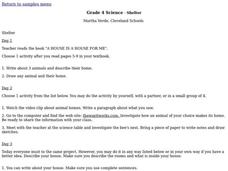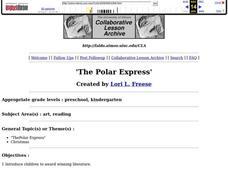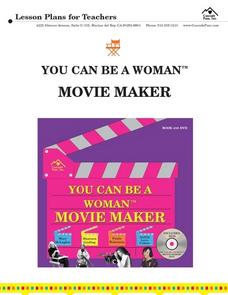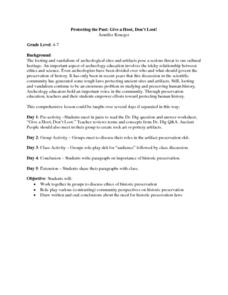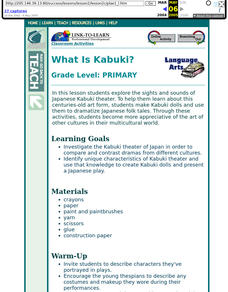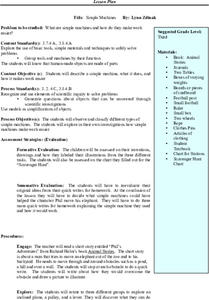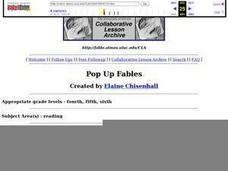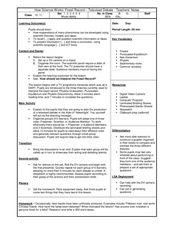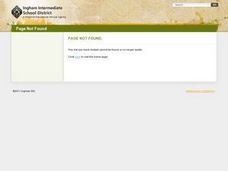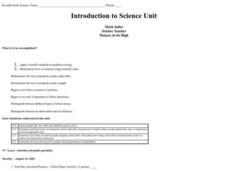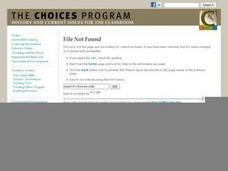Curated OER
Homology
Students investigate the concept of homology. They are particularly interested in finding information about developmental homology. Students design a new animal correcting obvious mistakes on a worksheet provided by the teacher. They...
Curated OER
Shelter
Fourth graders listen as the teacher reads out loud "A House Is A House for Me". Each day for five days the students choose one activity out of two or three to complete. Conclusion arrives when all the students describe and write about...
Curated OER
The Polar Express
Students listen to the picture book, The Polar Express, and review events that happened in the story. Students draw pictures of what they might have seen on the way to the north pole.
Curated OER
What Do You Know About Saturn?
Students discuss what they know about Saturn. They create drawings to show what the planet looks like and identifies its characteristics. They write a paragraph about the planet as well.
Curated OER
YOU CAN BE A WOMAN MOVIE MAKER
High schoolers research and participate in activities to find out more information about women movie-makers.The use of reading a script and making storyboards are just a couple of examples.
Curated OER
Protecting the Past: Give a Hoot, Don't Loot
Students discuss the looting and vandalism of various archeological sites. In pairs, they read and complete a worksheet and review their answers as a class. In groups, they role play a artifact preservation skit and perform it to their...
Curated OER
Slithering Snake
Students identify the grapheme and phoneme for S. They practice writing the letter S and through listening activities, discriminate the phoneme /s/. They associate the phoneme /s/ with its letter representation and identify it in various...
Curated OER
What Are the Needs of Living Things?
In this living things worksheet, students will write down two facts about what a living thing needs to survive. Using these facts, students will draw a conclusion to how those needs are met.
Curated OER
Independent - To Be or Not Top Be: Say It Again, Uncle Sam
Fourth graders revise and edit an oral presentation on the American Revolution based on peer feedback. They refine their oral presentation style and pinpoint areas in need of improvement.
Curated OER
Classroom Conservation
Fourth graders suggest ways paper and other natural resources can be used and recycled in the classroom. Students conduct a investigation into paper use and make distinctions among observations, conclusions (inferences), and predictions.
Curated OER
Neanderthals on Trial
Students examine a drawing of a Neanderthal artifact that was found in Solvenia in 1996. They attempt to identify the artifact in small groups, and present their ideas to the whole class. They discover what scientists believe the...
Curated OER
Eating Your Words!
First graders study how to complete activities in sequential steps. They participate in various activities describing each step needed to complete the tasks. They work in pairs to type the list of steps necessary in making a sandwich. ...
Curated OER
The Writings of Robert Boyle
High schoolers read the introductory text describing the various sources for the history of Boyle's life. They produce a poster illustrating the sources of Boyle's life and writings.
Curated OER
Where Do Green Plants Get Energy?
Fourth graders realize that plants need light, water, and carbon dioxide to carry out photosynthesis. They participate in groups of 4 to plant (with materials provided) a test group of beans to compare to the control group, write a...
Curated OER
Raptor Poster Project
Learners create posters about raptors. They synthesize information they read about raptors and select a raptor. They draw a picture of their raptor and include facts relating to where it lives, characteristics, feeding habits, size, name...
Curated OER
Simple Machines
Third graders listen to a short story entitled, "Phil's Adventures" from a book called Animal Stories. They stop at each obstacle in the story and do a quick write about how they would overcome the obstacle and draw a picture to...
Curated OER
Quoting the Dalai Lama
Students read and reflect on statements made by the Dalai Lama and
discuss with cooperative group members what they believe is
meant by the statement and how to report this information the
rest of the class. They take turns presenting...
Curated OER
Writing a Cooperative Class Story (3+)
Pupils write a beginning of a story, or as much as they can in 5 minutes. They pass their papers in a given order, then read the other student story and continue it for another 5 minutes.
Curated OER
Pop Up Fables
Students read a fable and create a pop-up book of the fable. Students add the moral of the story to the back of the book.
Curated OER
How Science Works: Fossil Record - Televised Debate
Students compare the three theories used tp interpret fossil records. In this earth science lesson, students create a production of a televised debate. They collaborate with group members to generate relevant questions about the topic.
Curated OER
Tony's Spelling Troubles
Students are introduced to the given problem and describe in their own words the situation represented in a bar chart and tally chart. They then use a bar chart and tally chart to make sensible predictions.
Curated OER
Same, But Different
Young scholars compare and contrast specific characters in the book, "Old Henry." They discuss similarities and differences between people and define character traits. They assess one's own character traits and have a class discussion...
Curated OER
Introduction to Science
Seventh graders investigate scientific methods to solve problems. They demonstrate creating data tables and graphs. They study the role of a scientist and the importance of safety in a science lab. They distinguish between an...
Curated OER
How Does the USA Patriot Act Approach Race?
Students define and discuss the definitions of race and terrorism as a class. Using the Patriot Act, they analyze it and identify how it is a response to terrorism. They discuss how the documents could be viewed as one that supports...



